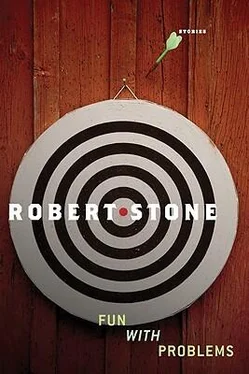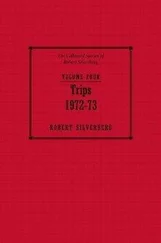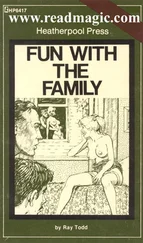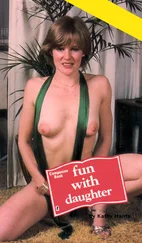Leroy decided that it did not matter to him. Even if all the forces of the eternal loser were able to combine against his superior mind, people like himself had to prevail. Because morality was functional. To be strong was to be hard, to laugh at punks who never dreamed of taking the first step toward getting what they wanted, who never knew. Never knew except to resent and set petty traps.
Oh, and they hated being called by the names they chose for themselves by virtue of their own absurdity. And their humor was frail; they hated the jokes that required them to act out their foolishness and impotence. They had to live the reality that the elected provided for them. In their sheepy droves they hated Leroy and his like.
Angry, he burst out onto the patio. In his rage he brought his hand down hard on his metal outdoor breakfast table, again and again. While his legato echoed on the wall, he heard a faint but curious sound. Looking up, he saw a dark brown shape. It stayed in place without motion. In a moment, the overhead lights above his pool cast two glowing lights on the lower extension of the thing. What glowed was a pair of bright yellow eyes. It was a cat, coiled, about to spring.
Somehow Leroy managed to leap into the pool. His plunge took him below the surface for a second, and as he fought to clear his vision he made himself hope that he had imagined the thing. But then he saw the panther in the very place he had been standing. It was trembling, regarding him from the far edge of time. Its face was skull-like.
Immediately the big cat moved around to the other side of the pool so that it waited behind him. He turned, treading water, fighting for breath. Floating in the middle of the pool was a large red and green beach ball. He put his arms around it to stay afloat, but it seemed to be drifting toward the side of the pool where the cat waited. Leroy came so close that the cat reached out over the water and, as Leroy watched, a pair of claws the size of kitchen knives shot out from its paw's black pads. The cat growled what sounded to him like a command to despair. Leroy, hanging on to his buoyant toy, saw something dreadful that he recognized in the animal grin and extended fangs. Unrelenting confidence. Dead certainty.
Leroy clung to the merry beach ball. The harder he clung to it, the more it seemed to drift toward the panther's reach. Batted by an almost casual thrust of the cat's claw, the ball began to spin in his slippery embrace. The cat was circling the pool, tense but assured as any mere animal could be, feinting, reversing ground. At play. Leroy began to scream for help. His breath was failing, but on each inhalation he clung harder to the whirling ball.
Overhead the stars had come out, the Milky Way. Leroy thought it might be a trail, a way out. All at once from somewhere in the canyon he heard a voice, one he thought he remembered. He called to it for help with all the breath he could summon until he realized that the voice was singing.
"I'm drowning in the lowland, low land low."
The song was one he knew. It was the voice of Dongo. Dongo singing a song in the canyon.
"Drowning in the lowland sea."
Leroy, spinning with the beach ball, began to sing along.
I FIRST MET LUCY AT a movie premiere at Grauman's about midway between the death of Elvis Presley and the rise of Bill Clinton. Attending was a gesture of support for the director, who happened to be a friend of mine. The film's distributors had made a halfhearted lurch toward an old-style Grauman's opening, breaking out a hastily dyed red carpet. A couple of searchlights swept the murky night sky over downtown Hollywood. By then these occasions were exhausted flickers of the past, so there were none of the much-parodied rituals some of us watched in black-and-white newsreels at the corner Bijou. No more flashbulbs or narrators with society lockjaw telling us what the talent was wearing. Neither simpering interviewers nor doomed starlets walking the walk. The camera flashes and the demented fans crowding the velvet rope were all memories. Hollywood Boulevard was even rattier then than it is now. The only people around the marquee that night were frightenedlooking Japanese tourists and bright-eyed street freaks with slack smiles.
The picture was no good. It was the forced sequel to a 1960s hit with a plot cribbed from a John Ford movie of the fifties. It featured two very old actors, revered figures from the time of legend, and the point of it was the old dears' opportunity to recycle their best beloved shtick. The withered couple and their more agile doubles shuffled through outdoor adventures and a heartwarming geriatric romance stapled to some bits of fossil western. Attempts had been made to make it all contemporary with winks and nods and brain-dead ironizing.
The audience consisted mainly of people who were there on assignment, out of politeness, or from fear. There were also members of the moviegoing public, admitted by coupons available through the homes-of-celebrities tours and at the cashier counters of cheap restaurants. Raven-haired Lucy, with her throaty voice and dark-eyed Armenian fire, was in the picture briefly, as an Apache maid. I later learned she was not in the theater to take pleasure in the picture or even in her own performance. She had come in the service of romance, her own, involving an alcoholic, Heathcliffish British actor, the movie's villain.
Heathcliff had made Lucy crazy that night by escorting his handsome and chic wife, suddenly reunited with her husband and relocated from London. It seemed that the sight of them had stricken Lucy physically; when I saw her sitting alone a few seats down from me she was cringing tearfully in the darks and lights from the screen.
My first impulse was to leave her alone in her distress. I was certainly not impelled to a hypocritical display of concern. But it was one of those bells; I was unattached, still single, due to leave town in a week. Maybe I'd had a drink or smoked a joint before the appalling show. Anyway, I moved one seat toward her.
"Nice scenery," I said.
She looked at me in a flash of the Big Sky Country's exterior daylight, removing her stylish glasses to dab at her tears and sitting upright in her seat.
"Oh, thanks."
Her tone was predictably one of annoyed sarcasm, but I chose not to interpret it as the blowing off she intended. Sometimes you can parse a hasty word in the semidark and I decided not to be discouraged, at least not so quickly. I realized then that she had some connection with the picture on the screen. An actress, a production girl?
In those days, I was confident to the point of arrogance. I assumed I was growing more confident with time. How could I know that the more you knew the more troubled and cautious you became, that introspection cut your speed and endurance? We watched for a while and she shifted in her seat and touched her hair. I interpreted these as favorable portents and moved over to a place one seat away from her. At that distance I recognized her among the film's cast. Scarcely a minute later onscreen, Brion Pritchard, her real-life deceiver, callously gunned down her character, the Apache soubrette. I watched her witness the tearjerky frames of her own death scene. She appeared unmoved, stoical and grim.
"Good job," I said.
Lucy fidgeted, turned to me and spoke in a stage whisper that must have been audible three rows away.
"She sucked!" Lucy declared, distancing herself from the performance and turning such scorn on the hapless young indigen that I winced.
"So let's go," I suggested.
Lucy was reluctant to go, afraid of being spotted by our mutual friend the director, who had also produced the film. She expected to look to him for employment before long. However, she seemed to find being hit on a consolation. It was the first glimpse I had of her exhausting impulsiveness.
Читать дальше












